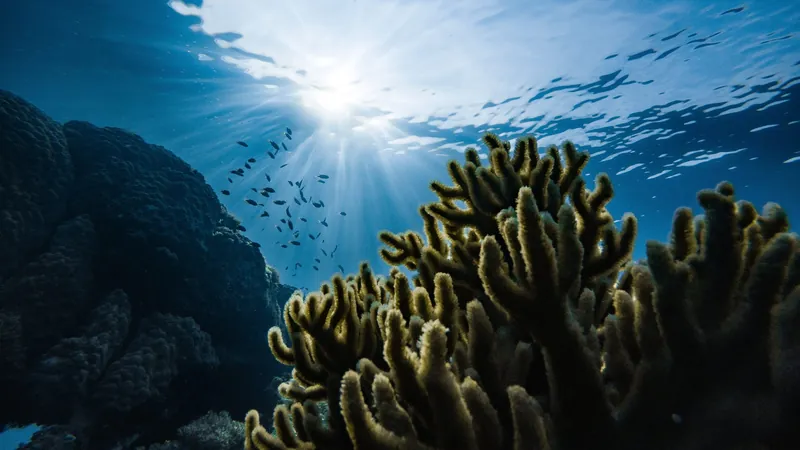
Unseen Consequences: How Light Pollution is Disrupting Coral Reef Nightlife
2024-12-23
Author: Siti
Introduction
As the sun dips below the horizon, the coral reef transforms into a different world—a sanctuary where daytime fish retreat and nocturnal hunters emerge. However, a groundbreaking study from the University of Bristol reveals that our modern world’s artificial lights are radically altering this natural order.
The Study
This research, which was recently published in Global Change Biology, highlights the disturbing effects of light pollution on marine ecosystems. Conducted by an international team of scientists spanning the UK, France, French Polynesia, and Chile, it stands as the first large-scale examination of the implications artificial light has on the nightlife of coral reefs.
Findings
Dr. Emma Weschke, a key figure in this study from the University of Bristol's School of Biological Sciences, explains that as twilight sets in over the reefs, a dramatic shift occurs. While vibrant marine life finds cover and rest in the coral structures, their predator counterparts become active hunters. In normal conditions, the darkness would protect these unsuspecting fish from predation. Yet, artificial light is revealing them to dangers they’ve never faced before.
Using innovative purpose-built underwater infrared cameras, which do not disturb fish behavior, the researchers captured firsthand the impact of artificial lighting. Their findings were alarming: reefs illuminated by artificial light not only saw a surge in nighttime fish activity but also attracted predators that thrive in the new visibility. Predatory species were out in greater numbers, taking advantage of the easier hunting conditions presented by the artificial illumination.
Dr. Weschke points out a troubling insight: many of the fish observed in lit environments were not nocturnal, but typically diurnal species that have been forced to remain active longer into the night. This shift raises concerns about the energy regeneration and fitness of these fish, much like it would for humans deprived of sleep.
Ecosystem Impact
Professor Andy Radford, a senior author of the study, emphasized how artificial lighting reduces the foraging efforts of predators, making it easier for them to locate and capture their prey. This means a tumble-down effect on the entire ecosystem, potentially destabilizing the reef community’s delicate balance.
After 25 consecutive nights of light exposure, notable changes in fish populations were documented. Conversely, exposing the reefs to light for just a few nights did not yield measurable impacts—a telling sign of the long-term adaptations occurring in these habitats.
Potential Solutions
Fortunately, there may be hope. Co-author Professor Steve Simpson noted that these findings might actually lead to 'low-cost solutions that are quick to implement.' He suggested that by simply reducing the intensity and duration of artificial light, we can enable a return to the naturally dark conditions that marine ecosystems have thrived under for millennia.
Unlike other pollutants such as greenhouse gases or plastics, artificial light is unique in that it doesn't linger once switched off. By prioritizing practical and essential uses of lighting while minimizing aesthetic applications, we can help restore balance to these invaluable coral reef habitats.
Conclusion
The ramifications of light pollution on our oceans deserve more attention. As our world continues to illuminate the night sky, it is crucial to remember the unseen lives being affected beneath the waves. An environmentally conscious shift in our nighttime habits could spell the difference for the future of coral reefs.
This alarming connection between artificial light and marine ecosystems illustrates that sometimes, what glimmers can be deadly. Understanding and addressing the consequences of our modern lifestyles is essential for the sustainability of our oceans. Will we choose to protect these vulnerable nocturnal beings, or will we continue to cast shadows over their survival?

 Brasil (PT)
Brasil (PT)
 Canada (EN)
Canada (EN)
 Chile (ES)
Chile (ES)
 Česko (CS)
Česko (CS)
 대한민국 (KO)
대한민국 (KO)
 España (ES)
España (ES)
 France (FR)
France (FR)
 Hong Kong (EN)
Hong Kong (EN)
 Italia (IT)
Italia (IT)
 日本 (JA)
日本 (JA)
 Magyarország (HU)
Magyarország (HU)
 Norge (NO)
Norge (NO)
 Polska (PL)
Polska (PL)
 Schweiz (DE)
Schweiz (DE)
 Singapore (EN)
Singapore (EN)
 Sverige (SV)
Sverige (SV)
 Suomi (FI)
Suomi (FI)
 Türkiye (TR)
Türkiye (TR)
 الإمارات العربية المتحدة (AR)
الإمارات العربية المتحدة (AR)